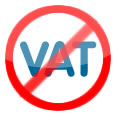The value-added tax is a pernicious levy.
It’s basically a hidden form of national sales tax, imposed every time a transaction occurs at any stage of the production process.
But what irks me about the VAT is not its design (indeed, it shares some key characteristics with the flat tax). What gets me agitated about the VAT is the fact that politicians always seem to treat the tax as a way of financing a larger burden of government spending.
That’s certainly what we’ve seen in Europe, both when the VAT was first implemented beginning about 45 years ago and more recently when many nations increased the rate to finance bailouts and faux Keynesian stimulus.
With this background, you’ll understand why I get excited whenever I see signs of anti-VAT fervor. Even in tiny and largely unknown British colonies such as the Turks and Caicos Islands.
Here are some excerpts from Tax-News.com.
On February 1, 2013, at a lengthy House of Assembly session, the newly elected Government backed a bill proposed by the opposition to block the introduction of the 11% VAT from April. 16 members backed the measure, with just 2 in favor of proceeding with the implementation of VAT. Since the announcement that VAT would be introduced, Turks and Caicos citizens and business groups have vehemently contended that VAT is inappropriate for the islands and is being “forced through” by the interim Government, at the behest of UK authorities.
Not surprisingly, given the pervasive statism in London (where the VAT rate was recently boosted to 20 percent), the U.K. government is on the wrong side of the issue, demanding that the VAT be imposed.
Last month, the UK’s Minister for the Overseas Territories, Mark Simmonds, rebuffed a request from the Turks and Caicos Islands’ new Premier, Rufus Ewing, that the implementation of the islands’ new value-added tax regime be deferred to allow time for the development of an alternative. He suggested that the islands review the regime in April 2014, a year after it is implemented.
The suggestion to “review” the VAT after one year is laughable. Sort of like asking someone to review their heroin usage after a year of addiction.
For those of us anchored in the real world, the only way to stop the VAT is to block it from ever being implemented. Because once politicians get hooked on a new source of revenue, there’s almost no hope of getting them to voluntarily relinquish those funds.
All that being said, I’m not a fan of the TCI government. Just like happened in the Cayman Islands (discussed in detail here), the government of the Turks and Caicos Islands spent too much money and put too many people on the payroll and paid them above-market wages (gee, sound familiar?).
They got in financial trouble, which led to intervention by the mother country.
But getting help from England on fiscal policy is like asking for dining advice from Hannibal Lecter.
The old TCI government was guilty of overspending, and now the U.K. thinks the answer is overtaxing.
I hope the new TCI government is able to somehow thwart the VAT. But if they’re serious about stopping that odious tax, then they better take some genuine steps to restrain government spending and prune bureaucratic expenses.
I’m not sure what lesson we have for the United States, other than the fact that we should fight to our last breaths before we let this awful tax get imposed in America. This video has more details.

